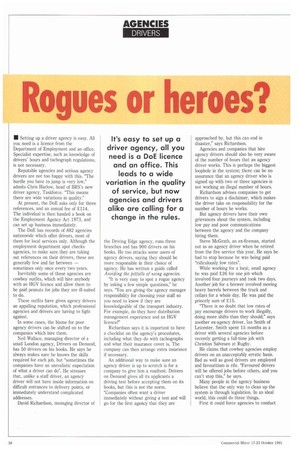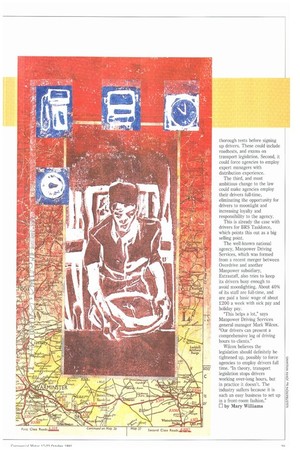Rogues or heroes?
Page 40

Page 41

If you've noticed an error in this article please click here to report it so we can fix it.
• Setting up a driver agency is easy. All you need is a licence from the Department of Employment and an office. Specialist expertise, such as knowledge of drivers hours and tachograph regulations, is not necessary.
Reputable agencies and serious agency drivers are not too happy with this. "The hurdle you have to jump is very low," admits Chris Harlow, head of BRS's new driver agency, Taskforce. "This means there are wide variations in quality."
At present, the DoE asks only for three references, and an annual fee of £114. The individual is then handed a book on the Employment Agency Act 1973, and can set up business immediately.
The DoE has records of 882 agencies nationwide which offer drivers, most of them for local services only. Although the employment department spot checks agencies, to make sure they are taking out references on their drivers, these are generally few and far between — sometimes only once every two years.
Inevitably some of these agencies are cowboy outfits, which will hire anybody with an HGV licence and allow them to be paid peanuts for jobs they are ill-suited to do.
These outfits have given agency drivers an appalling reputation, which professional agencies and drivers are having to fight against.
In some cases, the blame for poor agency drivers can be shifted on to the companies which hire them.
Neil Wallace, managing director of a small London agency, Drivers on Demand, has 50 drivers on his books. He says he always makes sure he knows the skills required for each job, but "sometimes the companies have an unrealistic expectation of what a driver can do". He stresses that, unlike a staff driver, an agency driver will not have inside information on difficult entrances to delivery points, or immediately understand complicated addresses.
David Richardson, managing director of the Driving Edge agency, runs three branches and has 900 drivers on his books. He too attacks some users of agency drivers, saying they should be more responsible in their choice of agency. He has written a guide called Avoiding the pitfalls of using agencies.
"It is very easy to spot a rogue agency by asking a few simple questions," he says. "You are giving the agency manager responsibility for choosing your staff so you need to know if they are knowledgeable of the transport industry. For example, do they have distribution management experience and an HGV licence?"
Richardson says it is important to have a checklist on the agency's procedures, including what they do with tachographs and what their insurance cover is. The company can then arrange extra insurance if necessary.
An additional way to make sure an agency driver is up to scratch is for a company to give him a roadtest. Drivers on Demand gives all its applicants a driving test before accepting them on its books, but this is not the norm. "Companies often want a driver immediately without giving a test and will go for the first agency that they are approached by, but this can end in disaster," says Richardson, Agencies and companies that hire agency drivers should also be very aware of the number of hours that an agency driver works. This is perhaps the biggest loophole in the system; there can be no assurance that an agency driver who is signed up with two or three agencies is not working an illegal number of hours.
Richardson advises companies to get drivers to sign a disclaimer, which makes the driver take on responsibility for the number of hours he works.
But agency drivers have their own grievances about the system, including low pay and poor communications between the agency and the company hiring them.
Steve McGrath, an ex-fireman, started out as an agency driver when he retired from the fire service this year. He says he had to stop because he was being paid "ridiculously low rates".
While working for a local, small agency he was paid £26 for one job which involved four journeys and took two days. Another job for a brewer involved moving heavy barrels between the truck and cellars for a whole day. He was paid the princely sum of £15.
"There is no doubt that low rates of pay encourage drivers to work illegally, doing more shifts than they should," says another ex-agency driver, Ian Smith of Leicester. Smith spent 15 months as a driver with several agencies before recently getting a full-time job with Christian Salvesen at Rugby.
He claims that cowboy agencies employ drivers on an unacceptably erratic basis. Bad as well as good drivers are employed and favouritism is rife. "Favoured drivers will be offered jobs before others, and you can't stop this," he says.
Many people in the agency business believe that the only way to clean up the system is through legislation. In an ideal world, this could do three things.
First it could force agencies to conduct thorough tests before signing up drivers. These could include roadtests, and exams on transport legislation. Second, it could force agencies to employ expert managers with distribution experience.
The third, and most ambitious change to the law could make agencies employ their drivers full-time, eliminating the opportunity for drivers to moonlight and increasing loyalty and responsibility to the agency.
This is already the case with drivers for BRS Taskforce, which points this out as a big selling point.
The well-known national agency, Manpower Driving Services, which was formed from a recent merger between Overdrive and another Manpower subsidiary, Extrastaff, also tries to keep its drivers busy enough to avoid moonlighting. About 40% of its staff are full-time, and are paid a basic wage of about £200 a week with sick pay and holiday pay.
"This helps a lot," says Manpower Driving Services general manager Mark Wilcox. "Our drivers can present a comprehensive log of driving hours to clients."
Wilcox believes the legislation should definitely be tightened up, possibly to force agencies to employ drivers full time. "In theory, transport legislation stops drivers working over-long hours, but in practice it doesn't. The industry suffers because it is such an easy business to set up in a front-room fashion." 0 by Mary Williams




















































































